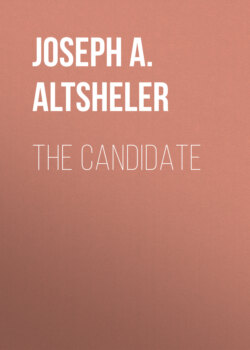Читать книгу The Candidate - Joseph A. Altsheler - Страница 8
На сайте Литреса книга снята с продажи.
ОглавлениеHarley glanced at her. The flush was still on her face, and there was a soft light in her eyes. He could not doubt that she was sincere, and she started in his mind thoughts that were not altogether new to him; he wondered if excessive reverence for the antique did not indicate a detachment from the present, and therefore from life itself, and, as a logical sequence, a lack of feeling for one's own kind. He had heard an elderly man from Chicago, dragged about by his wife and daughters in Rome, exclaim in disgust, "I would not give a single street corner in Chicago for all Rome!" The elderly Chicagoan had been drowned in derisive laughter, but Harley could understand his point of view, and now, as he remembered him, he had for him a fellow-feeling.
Hobart took them through many streets, one much like another, and then over a white asphalt drive beside the great lake. The shores were low, but to Harley the lake had the calm restlessness and expanse of the sea, and the wind had the same keen tang that comes over miles of salt. He saw the girl's eyes linger upon the vast sheet of green, and the incipient hostility that he felt towards her disappeared for a time. Somewhere in her nature, strait though the place might be, there was a feeling for fine things, and he felt a kindred glow.
They were rather quiet when they drove back towards the hotel, but she spoke at last of her uncle James and his speech that night, which might justify the expectations of either his friends or his enemies. There had grown up lately in the theatrical world a practice of "trying a new piece on the dog"—that is, of presenting it first in some small town which was not too particular—but now the political world was moving differently in this particular case. The candidate was to make his first appearance in one of the greatest of cities, before two million people, so to speak, and the ordeal would be so severe that Harley found himself apprehensive for Jimmy Grayson's sake. The feeling was shared by his niece.
"You don't think he will fail, do you?" she said, in an appealing tone to Hobart.
"Fail!" replied that irrepressible optimist. "He can't fail! The bigger the crowd the better he will rise to the occasion."
But she did not seem to be wholly convinced by Hobart's cheerfulness, which was too general in its nature—that is, inclusive of everything—and turned to Harley and Tremaine as if seeking confirmation.
"It will be a terrible test," said Harley, frankly, "but I feel sure that Mr. Grayson will pass it with glory. He is a born orator, and he has courage."
"I thank you for your belief," she said, giving Harley a swift glance of gratitude, and unaccountably he felt a pleasing glow at the first gracious words she had ever spoken to him.
"I could not bear it if he failed," she continued. "He is my uncle, and he is our own Western man. What things would be in the newspapers to-morrow!"
"If Mr. Grayson should fail to-night, he would recover himself at his second speech; he has your spirit, you know," said the ancient Tremaine.
But she did not seem to relish his elderly gallantry. "How do you know I have spirit?" she asked. "I have done nothing to indicate it."
"I inferred it," replied he, bowing, but she only lifted her chin incredulously, and Tremaine subsided, his suppression giving Harley some quiet enjoyment.
They returned, chiefly in silence, to the hotel. The dusk was coming down over the great city, and with it a grayish mist that hid the walls of the buildings, although the electric lights in lofty stories twinkled through it like signal-fires from hill-tops. Miss Morgan seemed subdued, and at the hotel door she said to them in dismissal: "I thank you; you have given me much pleasure."
"I rather think that she is wrapped up in Mr. Grayson's success," said Hobart, "and, as she intimates, it will come pretty near to breaking her heart if he fails."
In the lobby Harley met Churchill, of the Monitor, and Churchill, as usual, was sneering.
"I imagine that Grayson will make a display of provincialism to-night," he said. "America will have to blush for herself. I have copies of the Monitor, and all our London cables show the greatest amazement in Great Britain and on the Continent that we should put up such an outré Western character for President, one of the Boys, you know."
"The Grayson of the Monitor is not the Grayson of reality," replied Harley, "and the opinion of Europe does not matter, because Europe knows nothing about Mr. Grayson."
"Oh, I see! You are falling under the influence," said Churchill, nastily.
"What do you mean?" demanded Harley.
But Churchill would not answer. He sauntered away still sneering. Harley looked after him angrily, but concluded in a few moments that his wrath was not worth while—Churchill, trained to look always in the wrong direction could never see anything right.
